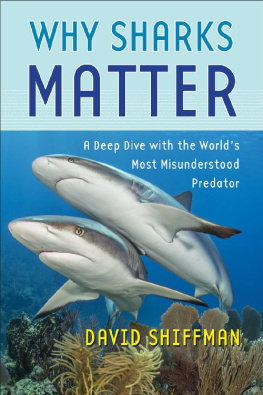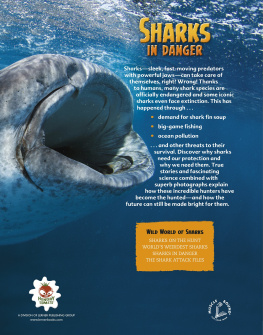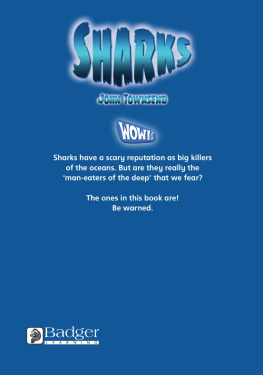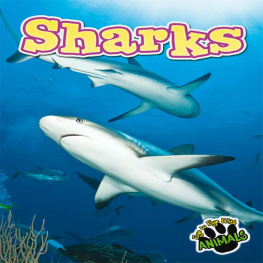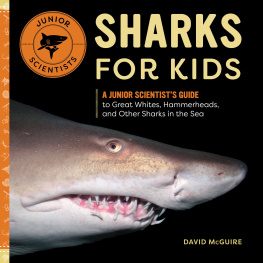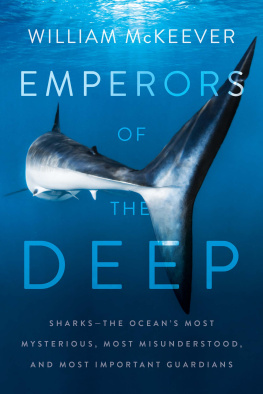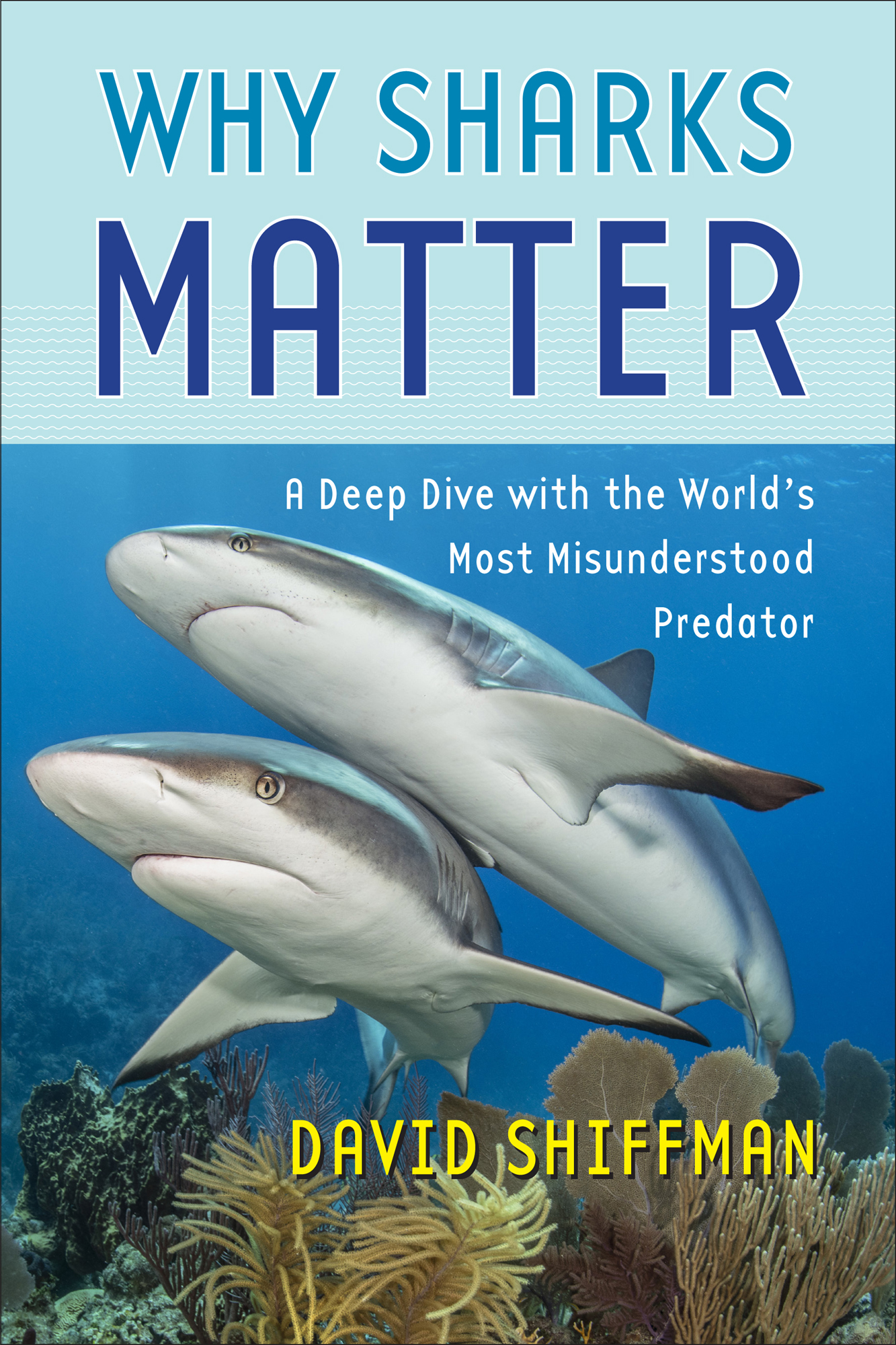Contents
Guide
WHY SHARKS MATTER
WHY SHARKS MATTER
A Deep Dive with the Worlds Most Misunderstood Predator
DAVID SHIFFMAN

J OHNS H OPKINS U NIVERSITY P RESS
Baltimore
2022 Johns Hopkins University Press
All rights reserved. Published 2022
Printed in the United States of America on acid-free paper
9 8 7 6 5 4 3 2 1
Johns Hopkins University Press
2715 North Charles Street
Baltimore, Maryland 21218-4363
www.press.jhu.edu
Library of Congress Cataloging-in-Publication Data
Names: Shiffman, David, author.
Title: Why sharks matter : a deep dive with the worlds most misunderstood predator / David Shiffman.
Description: Baltimore : Johns Hopkins University Press, 2022. | Includes index.
Identifiers: LCCN 2021022868 | ISBN 9781421443645 (hardcover) | ISBN 9781421443652 (ebook)
Subjects: LCSH: Sharks. | SharksBehavior. | SharksConservation.
Classification: LCC QL638.9 .S525 2022 | DDC 597.3dc23
LC record available at https://lccn.loc.gov/2021022868
A catalog record for this book is available from the British Library.
Special discounts are available for bulk purchases of this book. For more information, please contact Special Sales at .
To my family, for always supporting my dream of becoming a marine biologist
WHY SHARKS MATTER
Introduction
In the end, we will conserve only what we love; we will love only what we understand; and we will understand only what we are taught.
Senegalese environmentalist Baba Dioum
T hanks for reading this book and letting me be your guide to some of the most fascinating, important, threatened, and misunderstood animals on the planet.
My name is David, and Im a marine conservation biologist who studies sharks and how to protect them. You may know me from social media, where I am always happy to answer anyones questions about sharks. This seems only fair, since Im one of the lucky few who gets to live my childhood dream every day.
Ive been captivated by sharks as long as my family can remember, and Ive known for essentially my whole life that I wanted to be a marine biologist who studies them. While most kids go through either a shark thing or a dinosaur thing, I went through both phases. In the end, though, I chose sharks. My parents have always supported this crazy ambition of mine, but I suspect they believed that I would grow out of it. Clearly, I never did.
You might guess that an ocean lover like me grew up right on the beach, but I was raised outside of Pittsburgh, Pennsylvania. (According to DistanceBetweenCities.net, my childhood home was 368 miles from the nearest ocean.) So how does someone who grows up landlocked become obsessed with the sea? I read every book I could get my hands on, and I watched every documentary I could find. We were members of the Pittsburgh Zoo growing up, and I loved visiting the shark tank at whats now their PPG Aquarium complex.
I got scuba certified as soon as I was old enough and convinced my family that many of our annual vacations should include scuba diving. My younger brother, Eric, was hesitant to join me at first, but I eventually convinced him that most ocean animals are pretty small and generally mind their own business. We both needed to change our bathing suits, however, after his first open water dive, when an extremely large loggerhead sea turtle rushed at us from under a ledge.
Dad loves diving, while Mom is a good sport, content to read a book by the hotel pool no matter what country were in. Ive been diving on five continents so far and have a little over 800 logged dives. (I should briefly mention that zero of these dives were for work. A fun fact is that you can absolutely be a marine biologist if you are medically unable to scuba diveI know lots of marine biologists who dont even go on boats because they get seasick.)
Like all the cool kids, I went to marine biology summer camp in middle and high school. I spent five summers attending Seacamp on Big Pine Key, Florida, where I took one of my first formal marine biology classes. There, I learned about ichthyology (the study of fishes), coral reef ecology, and animal behavior. I even completed a course on the biology and behavior of sharks. The science instructors at Seacamp are all trained marine biologists, and meeting such amazing people only reinforced that this was the career I wanted.
While attending Seacamp, I met my first professional shark scientist, Dr. Jeffrey Carrier. Jeff created the shark biology course at Seacamp years earlier and still uses the camp as a staging ground for some of his research on nurse sharks in the Florida Keys. Jeff is one of the many passionate, brilliant, and colorful characters youll meet in this book. In 2020, I fulfilled a long-cherished dream of publishing a peer-reviewed scientific journal article with Jeff. I was even the lead author!
When it came time to apply for college, I finally had a chance to live near the ocean. I eventually chose Duke University, which has a coastal marine lab campus in North Carolinas Outer Banks. I ended up spending a semester and a summer at the marine lab, where I studied the feeding ecology of smooth butterfly rays, a fairly absurd looking relative of the stingray. I also studied abroad at James Cook University in Townsville, Australia, right on the Great Barrier Reef.
My college application essay was, of course, about sharks, specifically about going scuba diving in the shark tank at the New Jersey State Aquarium (now the Adventure Aquarium) with my father. I opened my essay with the line Dont worry, Dad, they dont usually eat people. This was particularly apropos because the tanks residents included large sand tiger sharks, which South Africans call ragged-tooth sharks because of their large and nasty-looking teeth. I included a photo of me next to an extremely large sand tiger shark. Years later, I was speaking at a Duke-sponsored event for prospective applicants, and a student asked one of the admissions officers on the panel what their all-time favorite essay was. She responded by praising a piece about swimming with sharks, despite not knowing that the intrepid author was sitting right on stage with her. I still maintain that essay got me into Duke.
After graduating from Duke, I returned to Seacamp, where I worked as a camp counselor and marine biology instructor. I even got to teach the shark biology class that had so inspired me as a middle school student. Ive since learned that one of the students I taught shark biology to at Seacamp returned years later as the shark biology instructor. In between working at Seacamp and starting graduate school, I took a course at the Bimini Biological Field Station, aka Shark Lab, taught by Daniel Abel and Dean Grubbs. Their book Shark Biology and Conservation notes that it is based on that very class.
I earned my masters degree in marine biology at the College of Charleston, where I studied the feeding ecology of sandbar sharks. I worked with Dr. Gorka Sancho from the College of Charleston and Bryan Frazier (who youll meet later in this book) from the South Carolina Department of Natural Resources. This is part of the reason I love sandbar sharks. Follow #BestShark on Twitter and Instagram and youll find that I spent years talking up this underappreciated species while senior colleagues teased me for having a supposedly boring shark as my favorite (see I got to see more sharks during my three years at Charleston than in the rest of the years of my life combined (so far). This is because the shark survey I participated in focused on smaller species and the coastal nursery areas they use. Studying lots of small sharks rather than a few larger sharks meant that it wasnt unusual for us to see a few hundred sharks in a day.


